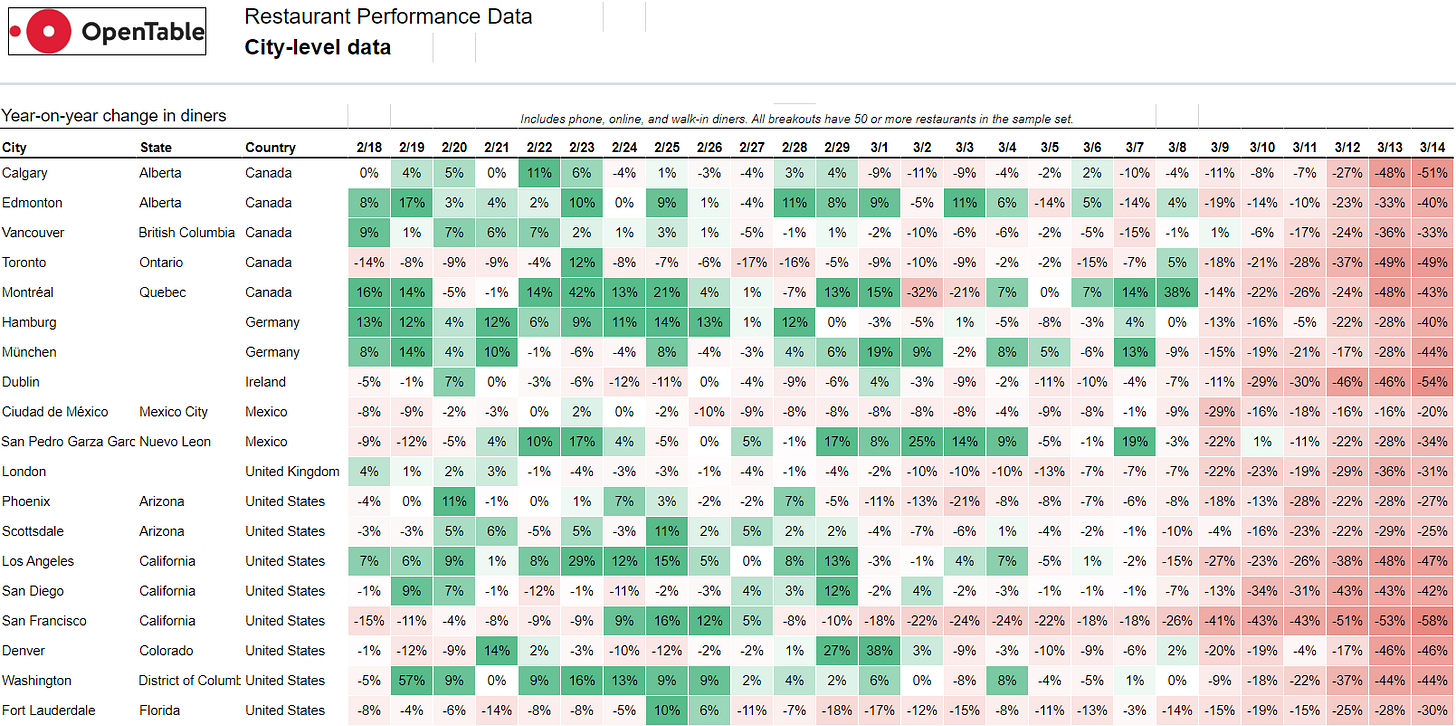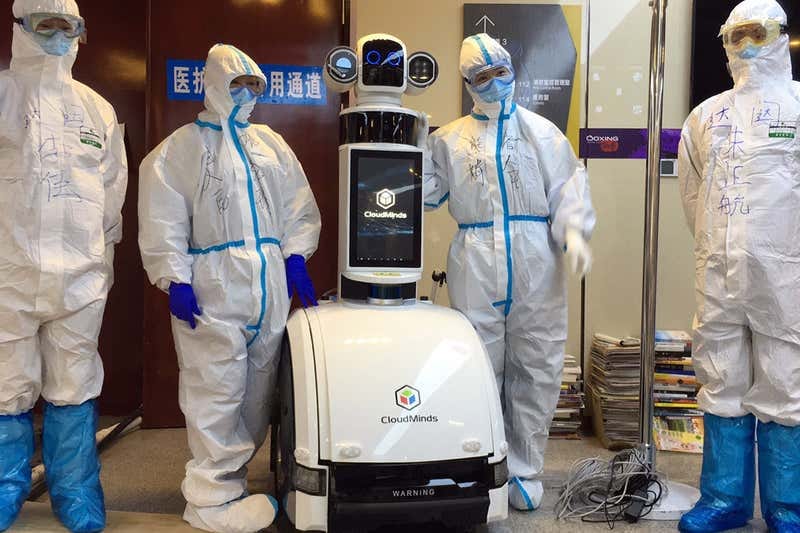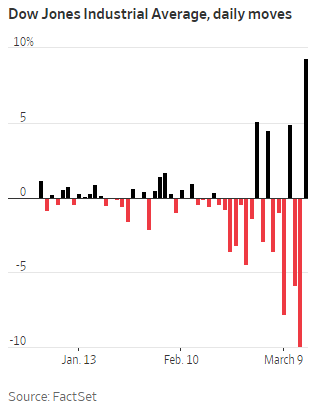Here’s your weekly wrap of technology, innovation, and finance news.
?? Coronavirus effects
Coronavirus again dominated news headlines this past week as infections picked up outside of China. The situation became real for many people when in the space of 20 minutes Tom Hanks announced he tested positive, the NBA suspended the season, and Trump announced travel restrictions for Europe.
If no preventative action is taken, the CDC’s worse-case modelling implies 200,000 to 1.7 million people could die in the US, which compares to 20,000 to 50,000 deaths from the seasonal flu each year.
Between 160 million and 214 million people in the United States could be infected over the course of the epidemic, according to a projection that encompasses the range of the four scenarios. That could last months or even over a year, with infections concentrated in shorter periods, staggered across time in different communities, experts said. As many as 200,000 to 1.7 million people could die.
And, the calculations based on the C.D.C.’s scenarios suggested, 2.4 million to 21 million people in the United States could require hospitalization, potentially crushing the nation’s medical system, which has only about 925,000 staffed hospital beds. Fewer than a tenth of those are for people who are critically ill.
Preventative actions like social distancing and quarantines are designed to slow the spread and reduce healthcare costs but have a direct impact on businesses.
France closed its schools, as have several other places. The CDC says school closures of 8 weeks or more may better mitigate the spread, while Science Magazine looked at whether closing schools actually worked.
There was a wonderful paper published that analyzed data regarding the Spanish flu in 1918, examining proactive versus reactive school closures. When did [regional] authorities close the schools relative to when the epidemic was spiking? What they found was that proactive school closing saved substantial numbers of lives. St. Louis closed the schools about a day in advance of the epidemic spiking, for 143 days. Pittsburgh closed 7 days after the peak and only for 53 days. And the death rate for the epidemic in St. Louis was roughly one-third as high as in Pittsburgh. These things work.
Moving to online learning is highlighting the difference between the digital haves and have-nots.
OpenTable shared a public spreadsheet that shows the impact on restaurant bookings in this environment. San Francisco is hardest hit with bookings down 58% on the 14th of March when compared to a year ago, which will have a significant impact on a typically low margin business.
Restaurant bookings are down 40% based on OpenTable’s data, but only 11% in Australia — I suspect that will change soon.
Apple closed all of its stores outside of mainland China (all of its stores in China are now open again after previously closing). Abercrombie, Nike, and others are closing their stores. Disney is closing its US and Paris resorts.
US domestic movie ticket sales fell 44% to $55.3 million, the lowest level since the weekend after September 11.
At least 150 companies have now warned of an earnings hit from coronavirus.
Amazon told all its employees around the world to work from home if they can, as did Twitter. Google extended its North American work from home recommendation to employees in the UK, Europe, the Middle East, and Africa.
The WSJ looked at what China’s nationwide hibernation was like.
Italians, which have been in lockdown, are sending 20% more messages on WhatsApp compared to a year ago, and Microsoft Teams usage in the country is up 100%.
South Korea is offering free concerts online to help people get through it.
As more conferences have been cancelled, several startups like Run the World and Hopin are hoping to better replicate the real-world conference experience by hosting virtual conferences that include the ability to network.
The alternate ideas have been fairly uninspired: webinars, panel livestreams. Xiaoyin Qu, the cofounder of a new virtual conference startup called Run the World, says the problem with most virtual conferences is the inability to meet other people. She attended dozens of conferences last year for market research and found that the best moments often weren’t the keynote speeches, but the breakout sessions or coffee breaks when conference attendees could bump into one another. When people met someone at a conference whose work was relevant to them, it made the $1,000 ticket worth it. When they didn’t, conferences sometimes felt like “a waste of time.”
? Gaming
The NBA, MLB, and many other sports were put on hold. Not even esports escaped, with Activision Blizzard cancelling all Overwatch League events in March and April and moving all Call of Duty League events to online-only.
Activision Blizzard also launched a new free-to-play battle royale game, Call of Duty: Warzone. The game is off to a solid start with 15 million players in its first 4 days.
? Robotics
A hospital ward staffed entirely by robots opened in Wuhan, China. The robots deliver food, drinks, and drugs to patients, and keep the ward clean.
The temporary ward was initially established as a human-run clinic, but has now been turned over to the robots after a week-long upgrade. Engineers mapped the area and uploaded the information to a cloud server for the robots to use as they move through the ward.
CloudMinds CEO Bill Huang says the ward will be a pilot case for future initiatives. “This is China’s first-ever entirely robot-led ward and an opportunity to test the capability of the technology and how we work together,” he says.
…
During their stay, patients wear bracelets fitted with sensors to measure their heart rates and temperatures. This information is displayed on a large screen outside the ward for doctors and nurses to access along with other health information. Medical staff can also use the screen to assign the robots their next task.
? Virtual and Augmented Reality
Oxford VR has launched a VR-based therapy to help people overcome social anxiety.
While VR is still struggling to gain adoption outside of gaming, health care is one area where it has been making real inroads. OVR builds immersive technology that aims to improve people’s mental health, and last month the company raised $13 million to push its offering into health care systems around the world. With its social engagement VR technology already used by major health organizations like the U.K.’s National Health Service (NHS), OVR is demonstrating one way VR could enter the mainstream.
⚡ Other Snippets
What a week in markets! WSJ provides a day-by-day recollection of the past week in Diary of a Crazy Week in the Markets.
CNBC profiled Everbridge, a company founded after 9/11 to help companies manage public safety emergencies and a beneficiary of coronavirus. Its stock has risen 17% since the market decline started on February 20.
Uber has resumed testing its autonomous cars on San Francisco roads.
Amazon has started offering its cashierless “Just Walk Out” technology to rival retailers. OTG, a hospitality group focused on airports, announced plans to deploy the technology, while others remain wary.
Eliott believes the product is analogous to retailers historically having used Amazon to build their early website or using AWS. “Eventually you realise that you are funding Amazon to continue to kill you in the market, you’re helping them fine tune their product so that they can better use it against you and you’re giving them all the data on your shoppers buying habits and ways of interacting with your stores. You’re then faced with a hefty bill to move off the Amazon platform.”
Personal Plug: Morningstar’s monthly rankings came out and my fund ranked 1st out of 264 funds in its category with a return of 27.7% over 1 year to February 2020, so that’s nice. Hopefully I can keep that up in these interesting times!
CNBC explores the future of energy storage beyond lithium-ion in this 14-minute video.









